Issue 2 2018
Table of Contents
- From the Director
- ‘Grain Science Transforming our Future’ Conference
- Welcome to new Postdoctoral researcher Wei Zou
- Mentoring program puts spotlight on science
- International rice training for Rachael
- The production of split and whole seed pulse flakes
- Rice Field Day 2018
From the Director
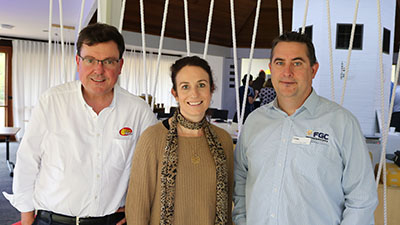 Welcome to the latest FGC newsletter. There’s been plenty happening in the Centre and I hope you enjoy reading about some of our highlights.
Welcome to the latest FGC newsletter. There’s been plenty happening in the Centre and I hope you enjoy reading about some of our highlights.
Centre members have been enjoying a lot of success recently. Rachael Wood has been successful in obtaining a scholarship to travel to IRRI to learn about rice production. Sion Tan was successful in his application for the AB Blakeney early career research travel award. Dan Waters was successful in his application to participate in the Rice Industry leadership program. Michelle, Shiwangni, Stephen and Esther were all successful in making the final of the Charles Sturt University Three Minute Thesis 3MT competition. Deb Metcalf has been successful in her application for a PhD scholarship and will commence working on a hemp seed project soon. Well done everyone!
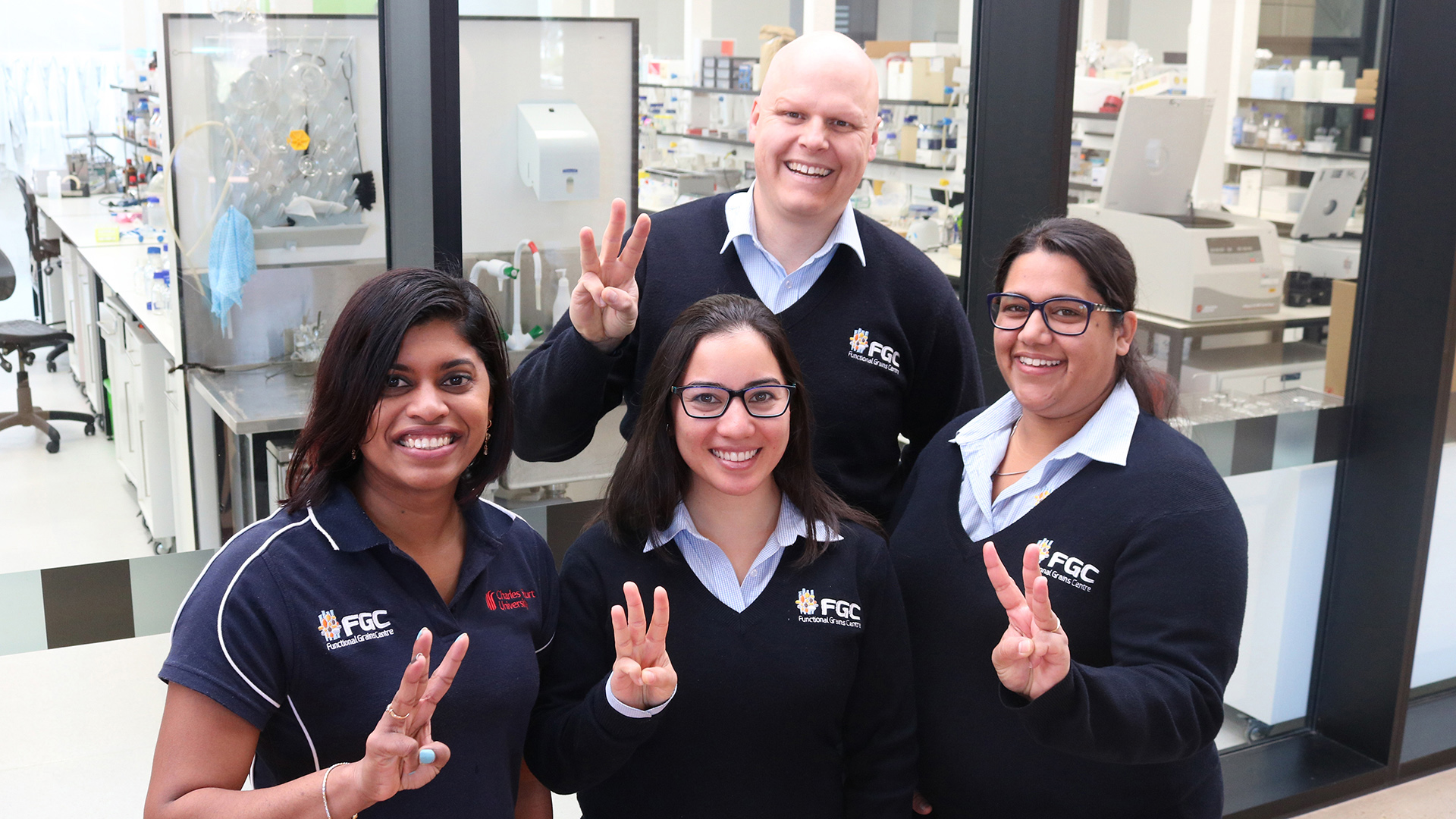 We have been pleased to welcome some new staff to the centre recently. Wei Zhou has commenced as a postdoc working on rice digestibility while Quincy Zhang has commenced an internship with the FGC, funded by the Graham Centre. Aysa Pourvali has joined us to work on a lupin alkaloids project. We are also sad to farewell John Mawson who will be returning home to New Zealand soon. John has made an enormous contribution to the Centre and will be sorely missed.
We have been pleased to welcome some new staff to the centre recently. Wei Zhou has commenced as a postdoc working on rice digestibility while Quincy Zhang has commenced an internship with the FGC, funded by the Graham Centre. Aysa Pourvali has joined us to work on a lupin alkaloids project. We are also sad to farewell John Mawson who will be returning home to New Zealand soon. John has made an enormous contribution to the Centre and will be sorely missed.
Funding for our Centre will come to an end soon. I am currently working with the External Advisory committee on a rebid strategy. While we have excellent support from our current partners, we are hoping to provide the opportunity to welcome new partners in our next funding application. If there are other partners out there who are as passionate as us about transforming the grains industry, we would like to hear from you.
Regards,
Professor Chris Blanchard
Photo caption: Professor Chris Blanchard (right) is pictured with Tom Howard, SunRice General Manager AGS, Grower Services and Agronomic Development, and Heather Stokoe, SunRice R&D Manager during a workshop in May where the FGC rice team presented their research.
Photo caption: Best wishes to Shiwangni, Stephen, Michelle and Esther who will compete in the Charles Sturt 3MT final.
‘Grain Science Transforming our Future’ Conference
Grain scientists will converge on Wagga Wagga in September for an international conference putting the spotlight on breeding, processing, nutrition and consumer foods.
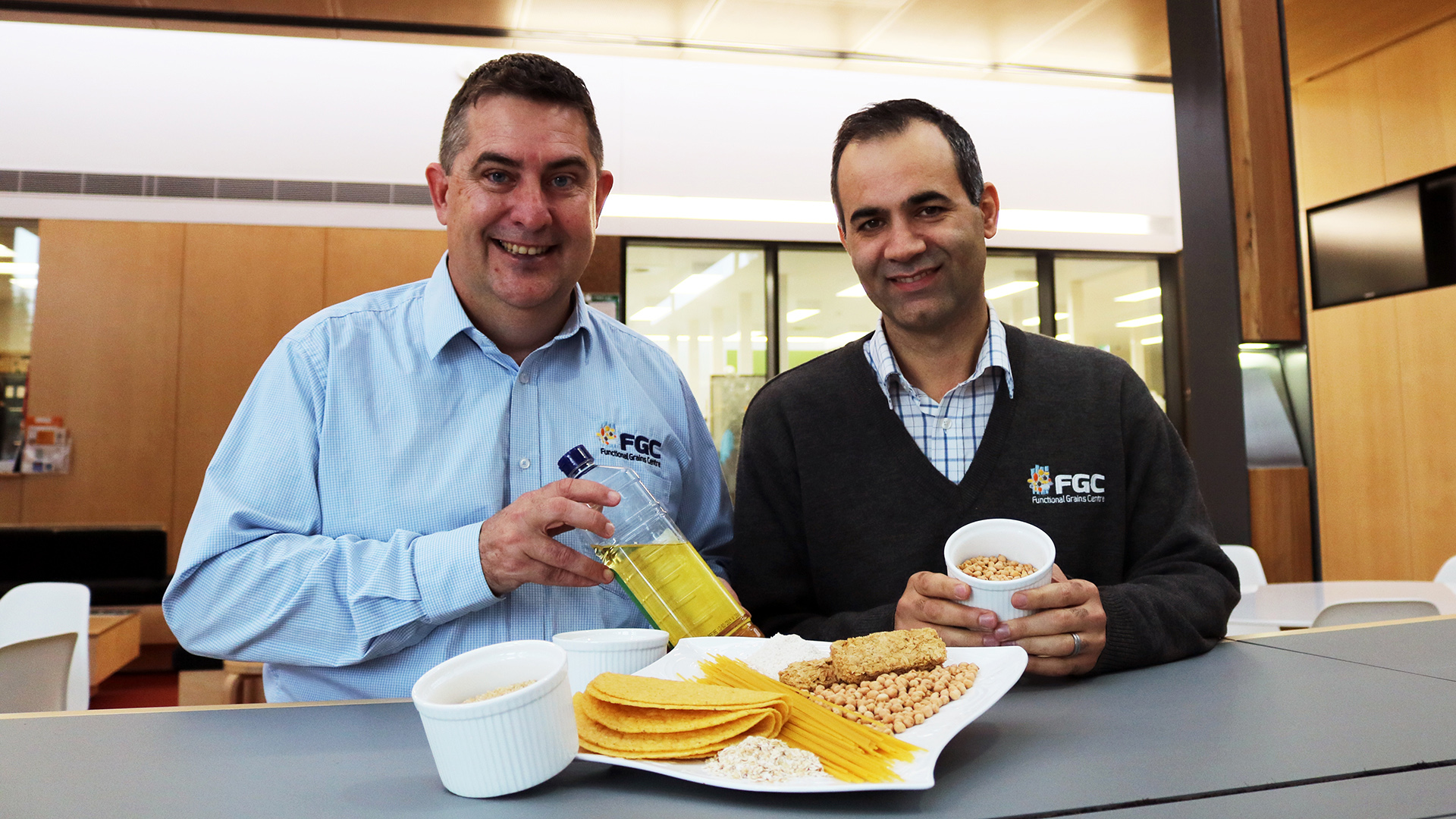 The 68th Australasian Grain Science Conference will be held at Charles Sturt University in Wagga Wagga from Monday 10 September to Wednesday 13 September 2018.
The 68th Australasian Grain Science Conference will be held at Charles Sturt University in Wagga Wagga from Monday 10 September to Wednesday 13 September 2018.
It is supported by the Australian Research Council (ARC) Industrial Transformation Training Centre for Functional Grains (FGC) and the Graham Centre for Agricultural Innovation.
Under the theme ‘Grain Science Transforming our Future’ the conference will bring together scientific and technical experts.
Conference co-chairman and FGC Director Professor Chris Blanchard said, “Wagga Wagga is in the heart of the NSW grain belt and we’re looking forward to welcoming experts working in grain science and technology.”
“The conference will be an opportunity to hear about new developments to improve the profitability and sustainability of the entire grains value chain.”
Co-chairman Dr Asgar Farahnaky said the conference themes are market intelligence, capacity building, and value adding technologies.
“There is a strong focus on research that aims to transform the Australasian grains industry to a high value food and feed industry.
“Speakers include Grains Research and Development Corporation (GRDC) Deputy Chief Executive Officer Dr Steve Thomas, University of Queensland Professor Ian Goodwin, whose research has uses biotechnological tools for crop improvement and Dr Tristan Coram from Australia’s largest plant breeding company, Australian Grain Technologies.
“We’re also pleased to welcome Professor Weining Huang, from the School of Food Science and Technology at Jiangnan University in China who has expertise in cereal and bakery foods, rheology and texture, with emphasis on oriental food products using new food ingredients and new technologies.”
For more information email conference@ausgrainscience.org.au
Photo caption: Conference Co-Chairs Professor Chris Blanchard and Dr Asgar Farahnaky
Welcome to new Postdoctoral researcher Wei Zou
The Functional Grains Centre (FGC) is pleased to welcome a new Postdoctoral researcher Dr Wei Zou, who has research experience in China and Australia.
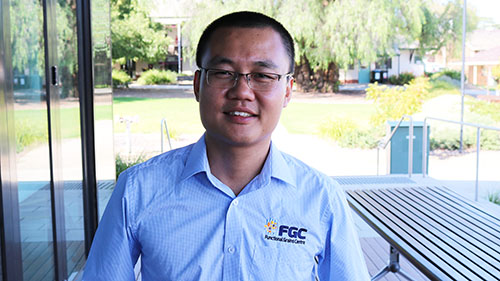 His research career began with a Bachelor of Science honours project isolating, purifying and structurally characterising non-starch polysaccharides from the seeds of Plantago asiatica, a perennial flowering plant native to East Asia.
His research career began with a Bachelor of Science honours project isolating, purifying and structurally characterising non-starch polysaccharides from the seeds of Plantago asiatica, a perennial flowering plant native to East Asia.
This was followed by a three years Master of Science and Technology degree in South China University of Technology, developing starch-based biodegradable super-absorbents through graft copolymerization.
After that Dr Zou began a new research life in Australia, studying for a PhD in Food Science which was awarded in March 2017 by the Queensland Alliance for Agriculture and Food Innovation (QAAFI) at the University of Queensland. His PhD titled, ‘Mechanism of Reduction in Starch Digestion Rate of Durum Wheat by Protein’ aimed to explore the mechanism of durum wheat proteins in slowing starch digestion. This reduction in starch digestion rate is nutritionally advantageous.
Dr Zou’s research led to two first-authored and another four co-authored research papers published in quality, peer reviewed journals (Food Chemistry, Carbohydrate Polymers, Journal of Agricultural and Food Chemistry) and three oral presentations which were made to the American Association of Cereal Chemists International Conference and the Australasian Grain Science Association. His curiosity, enthusiasm and career goals are on nutrition research, especially in connection with agriculture.
Dr Zou’s current research at the FGC is to develop an in vitro rice starch digestibility assay for rapidly predicting the GI of rice cultivars and breeding lines, to meet the needs of breeding programs which require high throughput assays which can screen hundreds, if not thousands, of rice lines within tight timeframes.
Photo Caption Dr Wei Zou
Mentoring program puts spotlight on science
Model volcanos erupting with bi-carb soda and vinegar, oozing blue slime and exploding balloons.
These aren’t the type of experiments normally performed by PhD and Postdoctoral researchers from the Functional Grains Centre but that’s what happened when the team went to Mater Dei Catholic Primary School in Wagga Wagga.
This is the third year the Functional Grains Centre has been involved in the MyScience education program.
FGC scientists worked with groups of Year 5 students to design and carry out experiments, record the results and present the findings at a science expo.
The theme for the program this year was chemistry giving the FGC researchers an opportunity to share their knowledge and inspire some young scientists.
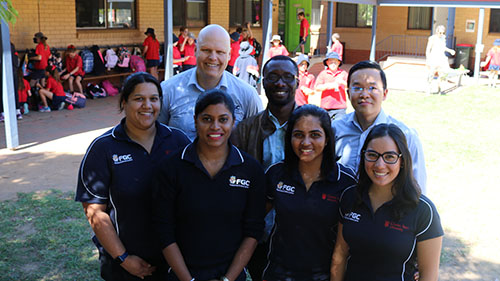
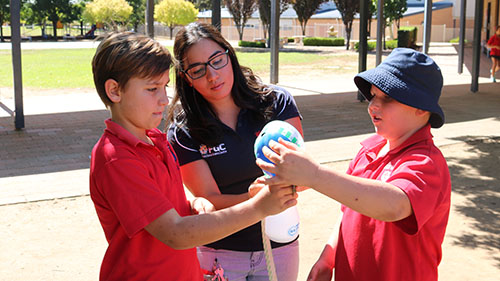
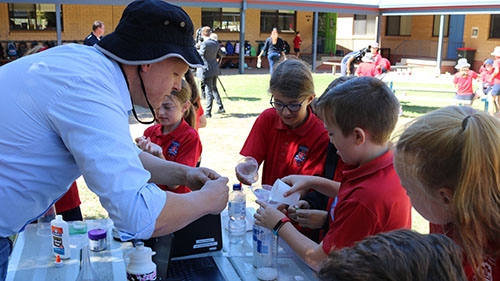
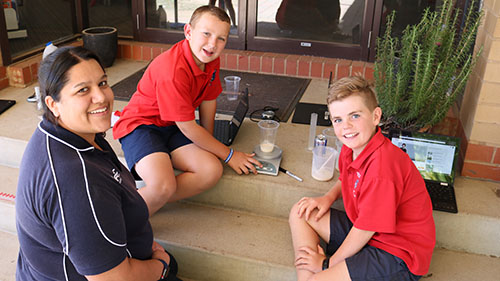
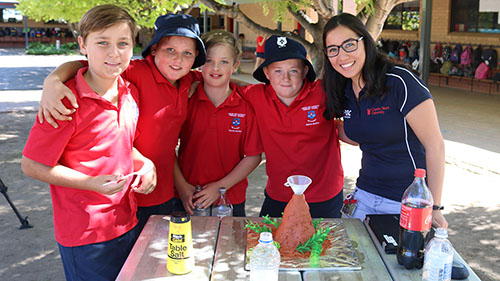
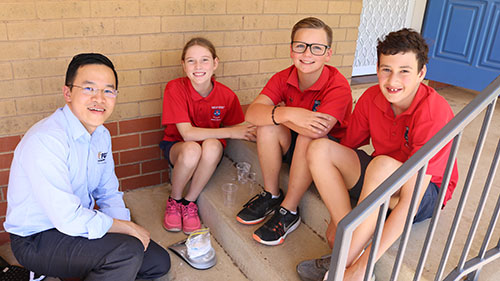
International rice training for Rachael
Functional Grains Centre (FGC) PhD candidate Ms Rachael Wood has been awarded a scholarship by the NSW Crawford Fund to attend an international training program.
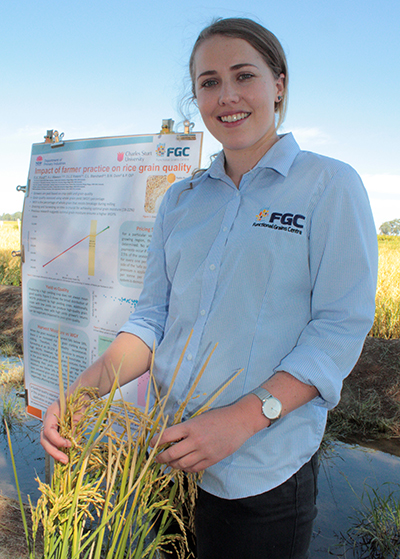 Ms Wood will take part in the rice production course through the International Rice Research Institute (IRRI) in The Philippines in August.
Ms Wood will take part in the rice production course through the International Rice Research Institute (IRRI) in The Philippines in August.
Also awarded a scholarship is Charles Sturt University PhD candidate Ms Brooke Kaveney.
Coordinator of the Crawford Fund NSW Committee and Australia’s inaugural Inspector-General of Biosecurity, Dr Helen Scott-Orr said, “The Crawford Fund is very pleased to be supporting students to encourage them in their studies and careers in agriculture for development.
“At the IRRI Rice Production training they will meet people from around the world who will be the rice research leaders of tomorrow and I look forward to their reports on the experience.”
A researcher at the NSW Department of Primary Industries (DPI) at Yanco, Ms Wood, is also a is keen to learn more about international rice research.
“I have a strong desire to engage in international agricultural research and attending this training program will help establish connections that could make this possible,” Ms Wood said.
“I believe that as the global population increases rice research is going to play an essential role in food security particularly for Asian and developing countries.
“Understanding the challenges facing international rice farmers is important in determining future research areas and I’m looking forward to gaining experience in tropical rice production.”
Back home Ms Wood’s PhD research at the FGC is investigating how rice grain quality is influenced by on-farm practices.
The aim is to identify strategies to help growers maximise their returns.
“Payments to ricegrowers include grain quality parameters, in particular whole grain yield (WGY), that is the percentage of whole grain that resists breakage during milling,” Ms Wood said.
“While a low harvest moisture can increase the risk of the grain cracking, we know that there are other factors that influence quality.
“My research is investigating the impact of farmer practices like planting density, the rate and timing of fertiliser application and irrigation protocols on rice grain quality.
“Aside from the WGY I’m also interested in grain colour, presence of chalk and the cooking and eating qualities of the rice.”
The research also has the potential to provide valuable information about how to reduce water use without compromising the grain quality of the rice.
“There’s a drive to increase water use efficiency in rice production, through strategies like dry sowing and delaying permanent water.
“At the moment there’s little data about how those irrigation practices impact on grain quality and my research aims to fill in some of the gaps,” Ms Wood said.
Photo caption: Rachael Wood at the 2018 rice industry field day, photo by Bernadette York NSW DPI
The production of split and whole seed pulse flakes
Functional Grains Centre PhD candidate Mr Stephen Cork is investigating innovative processing techniques to add value to pulse crops.
He outlines his research below.
Pulses are a food of global significance due to their high protein, dietary fibre content and benefits to agriculture. Pulse consumption is below recommended levels in developed countries and is also declining in developing nations. Pulse flakes are currently only present in the ready-to-eat (RTE) market as niche products, but could be a means of increasing pulse consumption if the challenges of their structural weakness, “unpleasant” flavours and long cooking times can be overcome.
Focus on flakes
Partnering with Woods grains and Uncle Tobys we have produced a range of pulse flakes. Trials have included Australian hulled and split desi chickpeas, spilt faba beans, whole kabuli and whole desi chickpeas. Pulses were first precooked for six minutes with different steam injection times (one, three or five minutes). The precooked splits were then passed through a roller flaker with two different roller gaps and the pulse flakes were finally dried using a fluidized bed drier at either 150°C or 200°C.
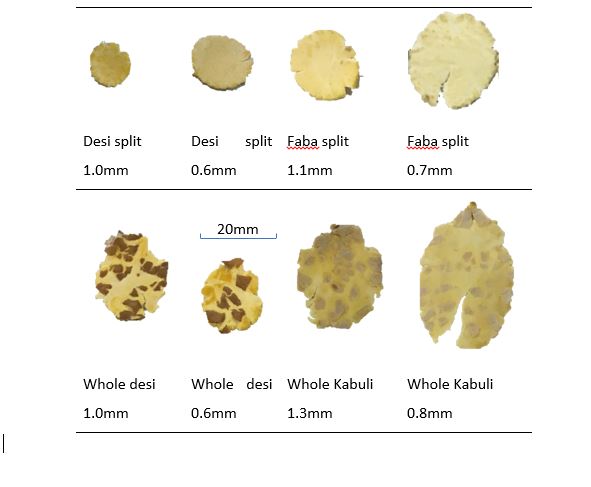
Pulse flakes maintain cell integrity and exhibit decreased intercellular adhesion compared to cereal flakes under the microscope. While flake processing subjectively softened the texture, shape and flavour of the final flake, further processing may be required to disrupt cellular structures to facilitate formation more homogenous robust matrix found in cereal flakes. Future work will evaluate the disruption of pulse cellular structures by extrusion into pellets and the effect on flake robustness.
Rice Field Day 2018
FGC Deputy Director Associate Professor Dan Waters reports on the annual Rice Industry Field Day.
A strong contingent of Functional Grains Centre members travelled to the Yanco Agricultural Institute on Thursday 15 March 15 for the NSW Department of Primary Industries (DPI) rice industry field day.
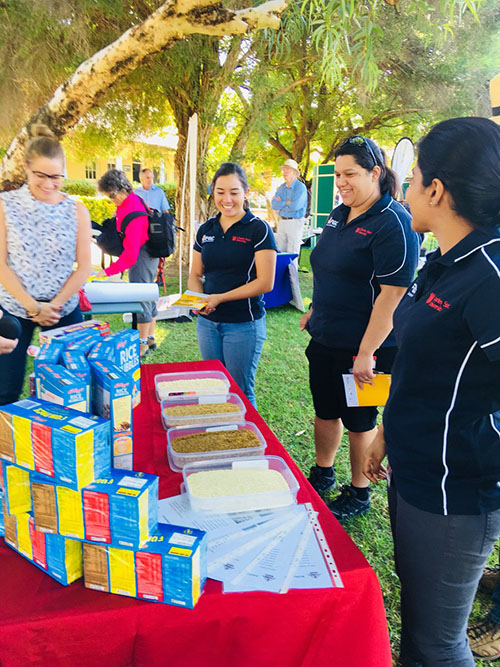 FGC members presented their research in poster displays and enjoyed the opportunity to talk with producers, other researchers and industry representatives.
FGC members presented their research in poster displays and enjoyed the opportunity to talk with producers, other researchers and industry representatives.
SunRice Chief Executive Officer Rob Gordon outlined his vision for the rice industry, a vision which puts rice quality front and centre. With the increased competition for water, the rice industry faces many challenges. However, Mr Gordon believes rice quality will play a key role in ensuring the ongoing profitability of the industry.
Kellogg’s was a high profile participant at the field day, outlining the long term relationship the company has with the Australian rice industry and its importance to the business. Rice quality is a key ingredient of the Kellogg’s business and as part of our discussions we learnt that FGC Director Professor Chris Blanchard’s research allowed them to better understand the unique rice milling requirements of a good rice bubble.
A highlight was learning that Kellogg’s gives a significant proportion of its profits to charity by way of the WK Kellogg Foundation. WK Kellogg created the foundation but mandated the Kellogg’s food company could not use the Foundation as part of its marketing, explaining why few of us know we give to charity each time we purchase a Kellogg’s product.
NSW DPI rice breeder Peter Snell had new rice lines and varieties on display while NSW DPI principal research scientist Mark Stevens spoke about pests such as snails and armyworms.
NSW DPI research agronomist Brian Dunn presented his work investigating sowing methods for rice without flood irrigation. FGC PhD student, and NSW DPI researcher Rachael Wood, had a starring role explaining her research of how farmer practices affect rice grain quality.
The field day was also an opportunity to for the rice industry to farewell Ian Mason from his role as AgriFutures R&D committee member and more recently Chairman, and to thank him for his untiring effort to be a positive influence on, and voice for, the rice industry over many years. Although his time with AgriFutures has drawn to a close, Ian continues as a SunRice board member and growing rice on his farm north of Finley.


